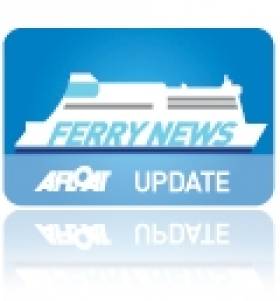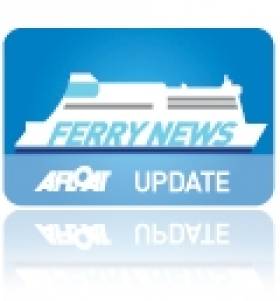Displaying items by tag: European Highlander
Highland Giants Head for the Causeway Coast
#SPONSORSHIP HIGHLAND GAMES – The venue of Glenarm Castle Estate on the stunning Antrim coast is where the P&O Ferries Dalriada Festival (13-14 July) is due to take place, writes Jehan Ashmore.
For 14 years Glenarm has played host to the world famous Highland Games and where yet again teams from Ireland and Scotland will be head to head as they battle in the grounds of the historic estate.
An integral part of the festival is 'The Clash of the Celtic Giants'. Participating is the UK's strongest man Glenn Ross who will be throwing down the gauntlet to his Scottish counterparts after making the annual trip across the Irish Sea. The North Channel route between Cairnryan to Larne is operated by P&O Ferries, which celebrate their 175th anniversary this year and they are sponsoring the festival in Glenarm.
Arthur Murphy of P&O Ferries, said: "As operator of the shortest, fastest and most frequent crossings between Ireland and Scotland, P&O Ferries is delighted to sponsor the Dalriada Festival for the 10th year running".
"Since the start of our sponsorship of the Highland Games in 2002 we have witnessed the event grow in size, stature and popularity attracting even greater audiences to the picturesque coastal village of Glenarm.
Glenarm is around 11 miles from the Port of Larne where the sea-crossing to Cairnryan is 32 miles /51.2km. Passage time is just two hours for the aptly named ferry sisters European Highlander and European Causeway, to complete the crossing at a speed of 22 knots /25.3mph.
As previously reported the European Highlander, notably had the honour last month in transporting the 'other' games Olympic torch on its relay across the UK and detour to Dublin.
European Causeway was the first of the 20,000 tons pair built by Mitsubishi Heavy Industries in Shimonoseki, Japan. Each can carry 410 passengers, 375 cars or 116 X 13.5 freight units on the vehicle decks which equate to 1,771 lane metres.
Currently the sisters are accompanied by the P&O Express which provides additional 'fast-ferry' operated sailings. In addition the fast-ferry also covers crossings on the seasonal-only Larne-Troon route.
Port Out Starboard Home as Olympic Torch Travels P&OSH
#OLYMPIC FERRY– With 50 days to go to the start of the London Olympic Games, the torch-relay is to depart Northern Ireland this afternoon with P&O Ferries on the North Channel service to Scotland, writes Jehan Ashmore.
Before the flame reaches the Port of Larne, 67 torch-bearers will have carried the torch today on a near 120 mile journey across the north having departed Newcastle this morning.
A highlight of the day was a water crossing on Lough Neagh, where the flame was carried by the boat Island Warrior on the largest lake on the island of Ireland. Eorann O'Neil from Crumlin had the honour of torch-bearer and the 16 year-old was nominated for his dedication to swimming.
When the torch with its accompanying escort of support vehicles arrives in Larne mid-afternoon, the flame will be taken to an event to mark it leaving Northern Ireland. An hour later the torch's motorcade is to head for the port to board the P&O conventional ferry European Highlander on the 16.30hrs sailing for Cairnryan in Galloway. The 21,188grt ferry will arrive at the port on Lough Ryan some two hours later.
Tomorrow morning sees the start of the first relay in Scotland which is scheduled to start at 06.08hrs and takes place further down along Lough Ryan at the former ferryport of Stranraer.
The ferryport closed last November when Stena Line switched Scottish ferry terminals to Cairnryan, where sailings to Belfast are still maintained by a pair of 30, 285grt 'Superfast' sisters. Close to the new €80m Stena terminal is the existing terminal that serves P&O's operations.
Tomorrow's torch returns to Cairnryan as the relay route heads northwards to Glasgow which marks the day's final destination. After the torch completes touring Scotland the relay will cross the border to England to head back to London 70 days after originally embarking on a tour of the UK and detour to Dublin. The capital has been the only location visited by the torch relay outside that of the UK and Greece.































































